| Listing 1 - 10 of 74 | << page >> |
Sort by
|
Book
ISBN: 1438465475 9781438465470 9781438465456 1438465459 1438465467 Year: 2017 Publisher: Albany, New York : Excelsior Editions,
Abstract | Keywords | Export | Availability | Bookmark
 Loading...
Loading...Choose an application
- Reference Manager
- EndNote
- RefWorks (Direct export to RefWorks)
Honorable Mention, 2017 Foreword INDIES Book of the Year Awards in the Political Science CategoryFrom the hot savannah of Malawi to the cold, damp gray of Kosovo and into the volatile war zones of Iraq and Afghanistan, the United States and other donors have invested enormous financial and human resources in major peacekeeping and development efforts. Why then is the world no closer to being a "better and safer" place? Both a salient critique of US foreign assistance and a thought-provoking memoir, Flash Points describes the issues with personnel, language, and gender dynamics, as well as the cross-cultural challenges that often undermine and betray the best intentions of policy makers comfortably situated in Washington. Revealed in illuminating flashbacks, Jade Wu recalls her experiences in each of these four countries highlighting how, all too often, Americans in the field and the US government were unable to learn the lessons that ought to have been learned when dealing with host countries and their people. The final results were efforts poorly conceived and executed and, ultimately, detrimental to American national interests.
Book
ISBN: 9781629483887 1629483885 Year: 2013 Publisher: New York
Abstract | Keywords | Export | Availability | Bookmark
 Loading...
Loading...Choose an application
- Reference Manager
- EndNote
- RefWorks (Direct export to RefWorks)
Book
ISBN: 1280030372 9786610030378 9264163468 9264161252 Year: 1998 Volume: 1998, no. 28 Publisher: Paris Organization for Economic Cooperation and Development
Abstract | Keywords | Export | Availability | Bookmark
 Loading...
Loading...Choose an application
- Reference Manager
- EndNote
- RefWorks (Direct export to RefWorks)
The OECD Development Assistance Committee's 1998 review of the US development aid policies and programmes. It finds that after a period of declining support, the United States has in recent years worked to strengthen both political and public confidence in its foreign assistance programmes. USAID's new Strategic Plan, issued in September 1997, aims at clear results through its support of developing and transitional countries' efforts to achieve sustained economic and social progress and to share more fully in resolving global problems. An ambitious effort has been made to link the reform of aid management to clearer goals and stronger partnerships. Nevertheless, the volume of resources devoted by the United States to official development assistance has continued its downward trend. Measured as a percentage of GNP, the United States now provides the lowest amount, by far, of any Member of the OECD Development Assistance Committee (DAC). At its triennial review of the United States' aid policies and programmes on 6 April 1998, the DAC welcomed the measures that have been taken and looked forward to the full impact of the reforms and initiatives that have been launched. After serious international concern over recent years about diminishing funding and staffing in the United States programme, there are welcome first indications of strengthening budgets for aid to developing countries, confirmed by President Clinton's recent commitment to seek to increase the budget for African aid to its historically high levels. It is important that the United States pursue pro-development policies on a broad range of issues. Thus, the review gives special attention to the work of USAID in the areas of democracy, participation, governance, dealing with conflict and disasters, as well as the Transition Initiative, set up to help the United States respond to the needs falling between relief and development. Trade policy is also highlighted, as are the United States' multilateral contributions, and its role in promoting gender equality.
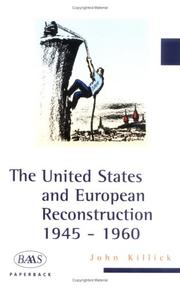
ISBN: 0585122911 9780585122915 1853311782 9781853311789 Year: 1998 Publisher: [Place of publication not identified] Edinburgh University Press
Abstract | Keywords | Export | Availability | Bookmark
 Loading...
Loading...Choose an application
- Reference Manager
- EndNote
- RefWorks (Direct export to RefWorks)
An accessible introduction to a key aspect in economic history – the impact of American financial intervention in Europe after the Second World War. Did 'American dollars save the world' in 1947? Would Europe have revived spontaneously after 1945? If the Marshall Plan – in conjunction with NATO – created a coherent and prosperous western bloc, was this critical for the outcome of the Cold War? Did American policy in some way cause the substantial convergence since 1945 intransatlantic productivity, incomes and living styles, or was this convergence bound to happen anyway?These are important questions, to which this careful analysis provides some new and provocative answers. Covering all the main areas of immediate post-war US policy in Europe it includes useful material on the Bretton Woods debates, the American loan negotiation with Britain as well as the Marshall Plan.
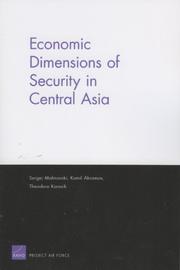
ISBN: 0833038664 9786611180850 1281180858 0833042424 9780833042422 9781281180858 9780833038661 Year: 2007 Publisher: Santa Monica, CA : RAND Project Air Force,
Abstract | Keywords | Export | Availability | Bookmark
 Loading...
Loading...Choose an application
- Reference Manager
- EndNote
- RefWorks (Direct export to RefWorks)
This report assesses the economic dimensions of security in post-Soviet Central Asia and considers their implications for the role of the United States. The September 11, 2001, attacks on the United States led to the realization among policymakers that instability, failed and failing states, and economic and political underdevelopment present security concerns not just to the states that suffer directly from these problems but to the global community as a whole. In this regard, Central Asia may be at a crossroads, as demonstrated by the so-called "Tulip Revolution" in Kyrgyzstan and the unrest
Economic assistance, American. --- Economic assistance, American --- Business & Economics --- Economic History --- Asia, Central --- Economic conditions --- Social conditions --- American economic assistance --- Mutual security program, 1951 --- -Asia, Central
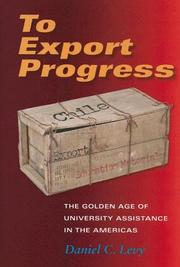
ISBN: 1282071777 9786612071775 0253111404 9780253111401 0253345774 9780253345776 0253345774 9780253345776 9781282071773 661207177X Year: 2005 Publisher: Bloomington Indiana University Press
Abstract | Keywords | Export | Availability | Bookmark
 Loading...
Loading...Choose an application
- Reference Manager
- EndNote
- RefWorks (Direct export to RefWorks)
"An immensely valuable and detailed analysis of foreign, mainly American, assistance to Latin American higher education, To Export Progress provides an understanding of the 'what' and the 'why' of foreign aid to a key sector. This book will be a classic in its field." -- Philip G. Altbach, Monan Professor of Higher Education, Boston College "Professor Daniel C. Levy, a leading authority in the field of higher education and the nonprofit sector in Latin America, once again has opened an otherwise neglected field through his carefully researched and reported study of philanthropic support for university reform in the region. Drawing on a wealth of archival material, documentary evidence, interviews, and first hand experience with the actors and agencies involved, To Export Progress illuminates the vision and ideals inspiring international agencies, as much as the realities they confronted in deciding on grants and loans policy, from the 1960s to the 1980s. The book is strongly recommended for scholars and students of international education, for Latin American experts, and for philanthropic managers and educational administrators in the developing world." -- Jorge Balan, Senior Program Officer for Higher Education, The Ford Foundation. In this study of the attempts to export the modern Western university, its ideas, and its form to the Third World, Daniel C. Levy examines the development assistance provided by the Ford Foundation, the U.S. Agency for International Development, and the Inter-American Development Bank and their relations with local partners in Latin America in the 1960s and 1970s. Levy considers the funders, how they selected partners, which countries and institutions were favored, and to what effect. Based on meticulous research and careful analysis, the book provides a detailed look at philanthropic assistance to the region during the era of modernization and development in Latin America.
Book
ISBN: 1621009858 9781621009856 9781621009832 1621009831 Year: 2012 Publisher: New York
Abstract | Keywords | Export | Availability | Bookmark
 Loading...
Loading...Choose an application
- Reference Manager
- EndNote
- RefWorks (Direct export to RefWorks)
Police training. --- Economic assistance, American. --- Military assistance, American. --- American military assistance --- American economic assistance --- Mutual security program, 1951 --- -Police --- Police professionalization --- Training --- Training of
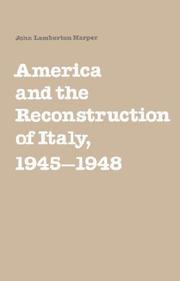
ISBN: 0521325188 052152282X 051152899X Year: 1986 Publisher: Cambridge : Cambridge University Press,
Abstract | Keywords | Export | Availability | Bookmark
 Loading...
Loading...Choose an application
- Reference Manager
- EndNote
- RefWorks (Direct export to RefWorks)
America's special relationship with Italy took form during the years 1945 to 1948. The postwar reconstruction period witnessed an intense struggle to determine the new Italy's political and economic orientation. By virtue of their physical presence, ambitions, and evident strategic interests in Italy, the Americans aspired to play an active part in the internal political contest and ideological debate. Professor Harper's book explores the American role in Italy from the end of the war until the decisive elections of 1948, setting forth its objectives, contradictions, and fundamental limitations. Concentrating on U.S. aid and the economic policies, Professor Harper skilfully traces the attempts of different parties within the U.S. government to build ties to their respective Italian counterparts to bring about basic changes in the Italian political economy. Those alliances remained largely inchoate as, despite their considerable power, the Americans lacked the intellectual preparation and diplomatic leverage to carry out their designs.
Economic assistance, American --- Reconstruction (1939-1951) --- American economic assistance --- Mutual security program, 1951 --- -Italy --- United States --- Foreign relations --- Arts and Humanities --- History --- -United States --- Italy
Book
ISBN: 1009007297 1009020846 1009020641 1316519201 Year: 2021 Publisher: Cambridge : Cambridge University Press,
Abstract | Keywords | Export | Availability | Bookmark
 Loading...
Loading...Choose an application
- Reference Manager
- EndNote
- RefWorks (Direct export to RefWorks)
Why do some donor governments pursue international development through recipient governments, while others bypass such local authorities? Weaving together scholarship in political economy, public administration and historical institutionalism, Simone Dietrich argues that the bureaucratic institutions of donor countries shape donor-recipient interactions differently despite similar international and recipient country conditions. Donor nations employ institutional constraints that authorize, enable and justify particular aid delivery tactics while precluding others. Offering quantitative and qualitative analyses of donor decision-making, the book illuminates how donors with neoliberally organized public sectors bypass recipient governments, while donors with more traditional public-sector-oriented institutions cooperate and engage recipient authorities on aid delivery. The book demonstrates how internal beliefs and practices about states and markets inform how donors see and set their objectives for foreign aid and international development itself. It informs debates about aid effectiveness and donor coordination and carries implications for the study of foreign policy, more broadly.
Economic assistance, American. --- Non-governmental organizations. --- Economic assistance, European. --- European economic assistance --- INGOs (International agencies) --- International non-governmental organizations --- NGOs (International agencies) --- Nongovernmental organizations --- Organizations, Non-governmental (International agencies) --- Private and voluntary organizations (International agencies) --- PVOs (International agencies) --- International agencies --- Nonprofit organizations --- American economic assistance --- Mutual security program, 1951 --- -Economic assistance, American. --- -European economic assistance --- -American economic assistance
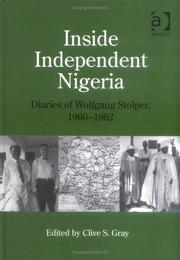
ISBN: 0754609952 Year: 2003 Publisher: [Burlington, VT] : Ashgate,
Abstract | Keywords | Export | Availability | Bookmark
 Loading...
Loading...Choose an application
- Reference Manager
- EndNote
- RefWorks (Direct export to RefWorks)
Economic assistance, American --- Aide économique américaine --- Nigeria --- Economic conditions --- Social conditions --- Conditions économiques --- Conditions sociales --- Aide économique américaine --- Conditions économiques --- American economic assistance --- Mutual security program, 1951 --- -Nigeria
| Listing 1 - 10 of 74 | << page >> |
Sort by
|

 Search
Search Feedback
Feedback About UniCat
About UniCat  Help
Help News
News